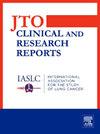Humanized Mouse Models for Immuno-Oncology Research: A Review and Implications in Lung Cancer Research
IF 3
Q2 ONCOLOGY
引用次数: 0
Abstract
Cancer immunotherapy has brought significant clinical benefits to patients with cancer, including those with lung cancer. Patient-derived tumor xenograft mouse models have become the preferred animal model for translational cancer research and preclinical studies. Given the unmet need for improved predictive models in immuno-oncology, humanized mouse models which are co-engrafted with both human tumors and immune system components have been used to investigate novel immunotherapeutics. These models have similarly been used to predict immune-related adverse events and to develop predictive biomarkers. This review summarizes key concepts related to humanized mouse models. We highlight the various approaches to generate them, factors that are critical to successfully establishing such models, their respective limitations, and considerations in model selection for preclinical lung cancer immuno-oncology research and therapeutic studies.
求助全文
约1分钟内获得全文
求助全文
来源期刊

JTO Clinical and Research Reports
Medicine-Oncology
CiteScore
4.20
自引率
0.00%
发文量
145
审稿时长
19 weeks
 求助内容:
求助内容: 应助结果提醒方式:
应助结果提醒方式:


